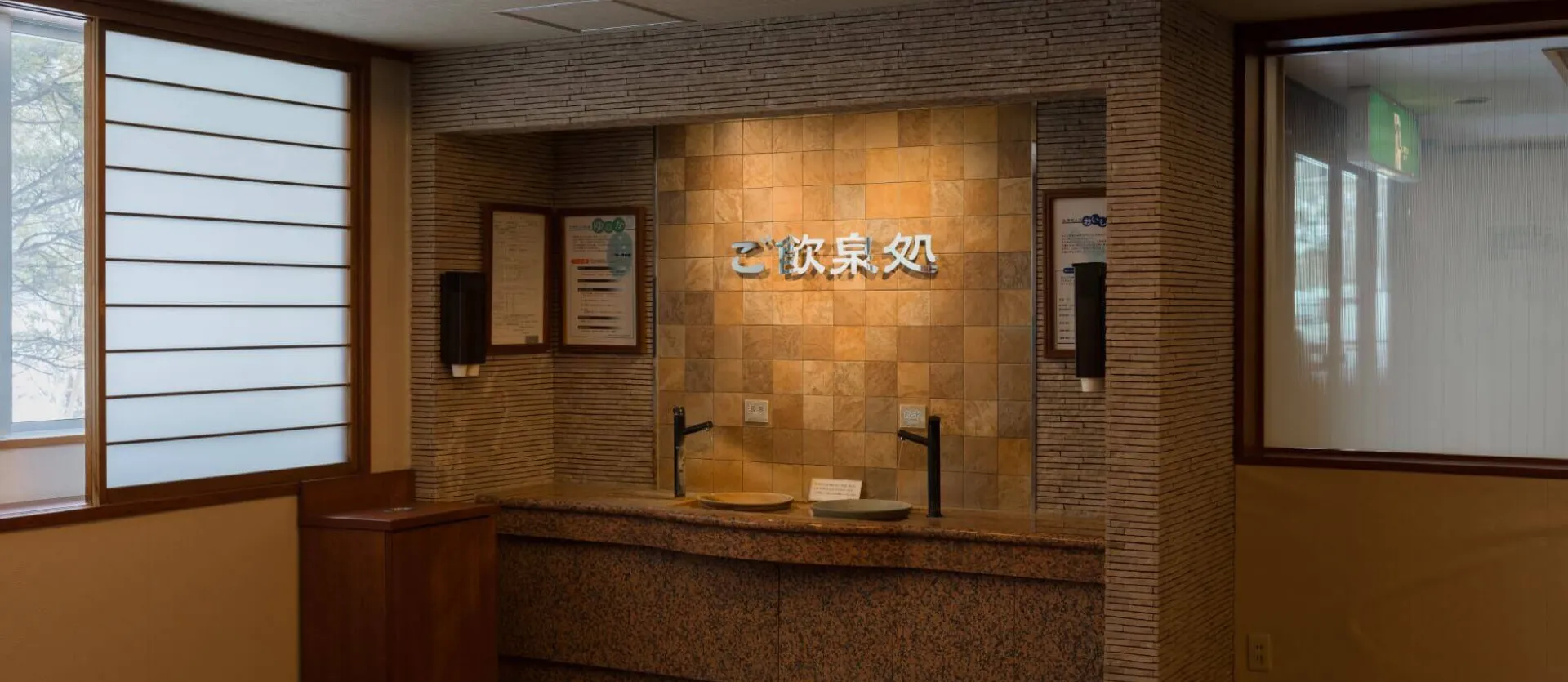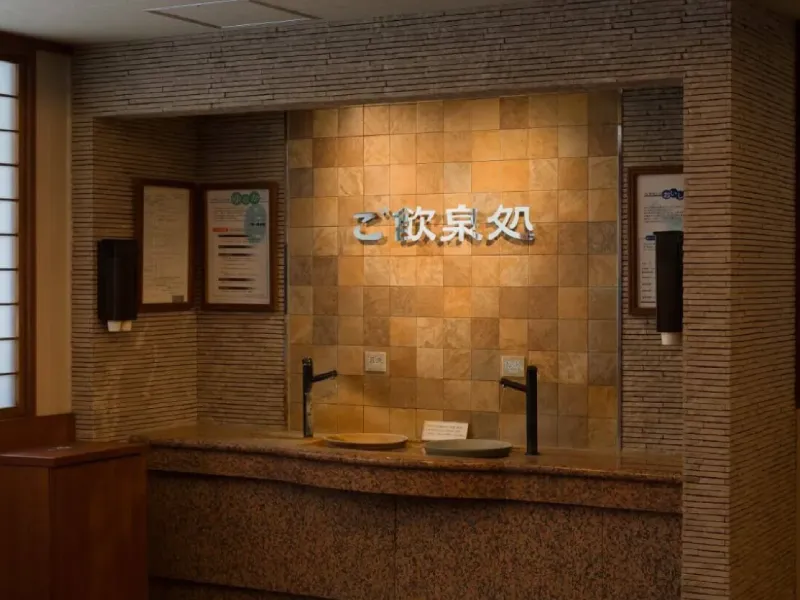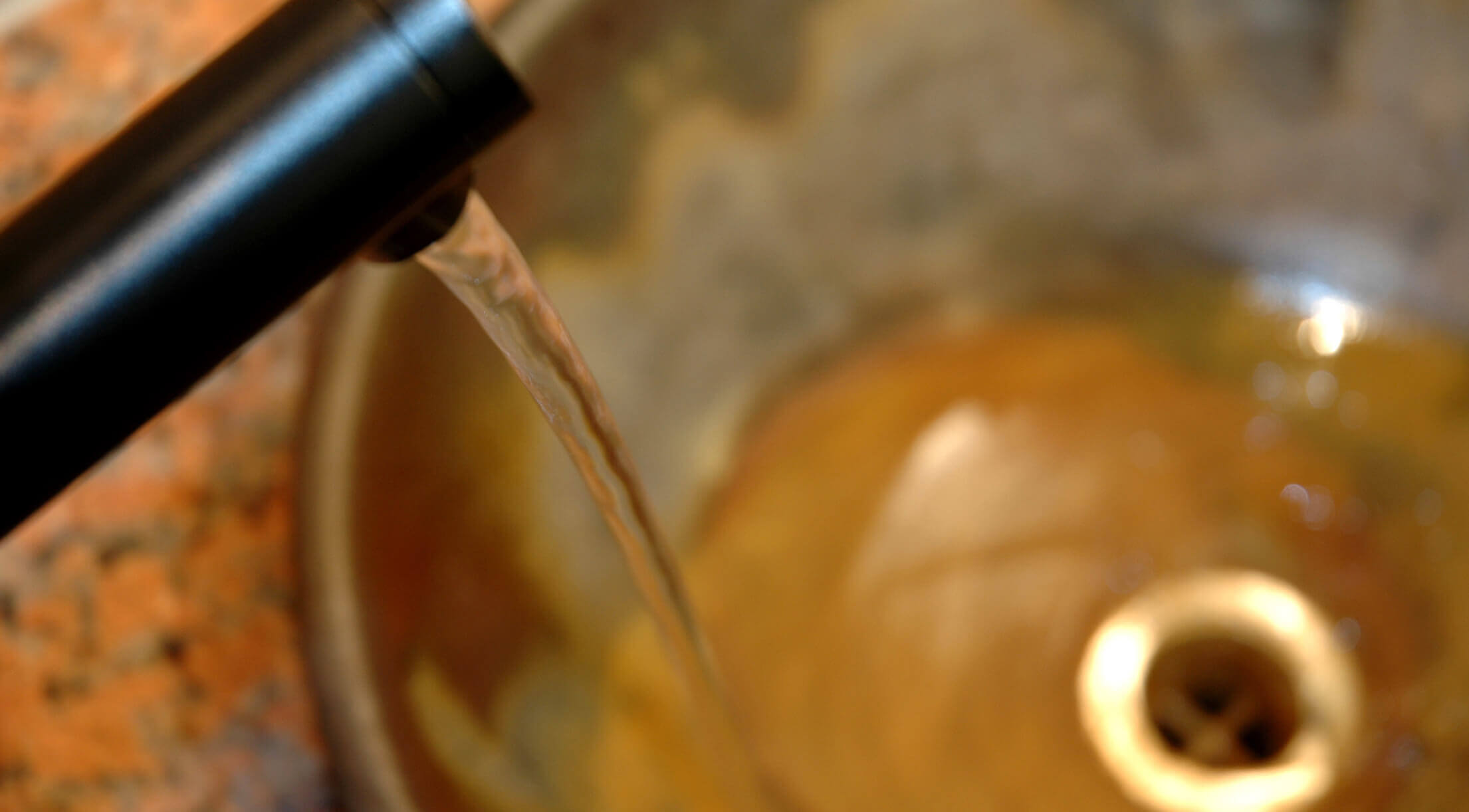

Drinking our sodium hot spring water is also good for your health.
Enjoy pampering your body inside and out.

Hot spring water: recommendations and cautions for drinking
- 1.
- Drink around 100ml – 200ml each time, for a total of 200ml – 1,000ml per day.
- 2.
- Drink 30 – 60 minutes before a meal.
- 3.
- Refrain from drinking after dinner.
- 4.
- For hot spring therapeutic treatments, follow your doctor’s advice.
Spring water type & temperature
Sodium chloride, calcium chloride, magnesium chloride, hydrogen carbonate (neutral hypotonic high-temperature hot spring) (former name: bicarbonate salt – earthy chloride spring)
Water temperature: 53.2°C
Contraindications for drinking
Kidney disease, hypertension, other diseases involving swelling
Indications for drinking
Chronic gastrointestinal problems, chronic constipation, diabetes, gout, and liver disease.
Note: The paper cups supplied at the drinking fountain hold about 200ml.
About Takimotokan’s delicious water
Because taste is subjective, there are no set rules about why water tastes good. However, most people agree on the following typical properties.
| Typical properties of water that tastes good | Takimotokan’s water | ||
|---|---|---|---|
| Water (ºC) | 20°C or under | 13.8 | Water that’s 20 – 25°C cooler than your body is said to taste good. |
| Total hardness (mg/l) | 10~100 | 41 | People differ on how hard they like their water. |
| Residue on evaporation (mg/l) | 30~200 | 140 | Residue on evaporation determines the richness and smoothness of water. |
| Organic matter (mg/l) | 3.0 or under | 0.5 | Excessive organic matter gives an astringent flavour. It also requires additional chlorine, which tastes bad. |
| Odour intensity | 3 or under | 0.5 | Odours such as mould and rot also affect taste. |
| Free carbon dioxide (mg/l) | 3~30 | 9.2 | The right amount of carbon dioxide gives a refreshing feeling, but too much can irritate. |
| Residual chlorine (mg/l) | 0.4 or under | None |
About Takimotokan’s delicious water
Taste is subjective. There are no hard and fast rules about what water tastes good. But water that many people regard as tasting good tends to have certain properties. Below are typical properties of water that tastes good.
| Water temperature (°C) | |
|---|---|
| Typical properties of water that tastes good | 20°C or under |
| Takimotokan’s good-tasting water | 13.8 |
| Water that’s 20 – 25°C cooler than your body is said to taste good. | |
| Total hardness (mg/l) | |
| Typical properties of water that tastes good | 10~100 |
| Takimotokan’s good-tasting water | 41 |
| People differ on how hard they like their water. | |
| Residue on evaporation (mg/l) | |
| Typical properties of water that tastes good | 30~200 |
| Takimotokan’s good-tasting water | 140 |
| Residue on evaporation determines the richness and smoothness of water. | |
| Organic matter (mg/l) | |
| Typical properties of water that tastes good | 3.0 or under |
| Takimotokan’s good-tasting water | 0.5 |
| Excessive organic matter gives an astringent flavour. Moreover, more chlorine needs to be added to water that contains excessive organic matter, and such water tastes bad. | |
| Odour intensity ( – ) | |
| Typical properties of water that tastes good | 3 or under |
| Takimotokan’s good-tasting water | 0.5 |
| Odours such as those of mould and rot can affect how water tastes. | |
| Free carbon dioxide (mg/l) | |
| Typical properties of water that tastes good | 3~30 |
| Takimotokan’s good-tasting water | 9.2 |
| The right amount of carbon dioxide gives a refreshing feeling, but too much can be irritating. | |
| Residual chlorine (mg/l) | |
| Typical properties of water that tastes good | 0.4 or under |
| Takimotokan’s good-tasting water | None |
Comments are closed.

